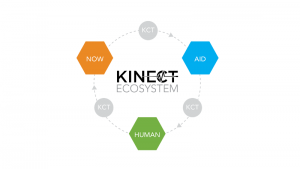
Guy Newing, Co-founder of Kinect said: “Infectious diseases like TB are entirely treatable, but hospitals in the developing world lack the infrastructure to deliver the care that is urgently needed. Our platform gives doctors and medical professionals the tools they need to bring about better patient outcomes, whilst incentivising those patients to adhere to treatments. The feedback from this pilot will be critical in informing and fine tuning our future implantations planned for 2019 and we’re very excited to continue the expansion of the platform.”

Kinect
Kinect evaluated many blockchain platforms before choosing Unify Earth. Using this as its base, KinectHuman is an electronic health record system which captures:
- patient consultations
- history
- tests
- diagnoses
- prescriptions
- outcomes.
Ease of use was a design priority. It seeks seamless integration into any health facility anywhere in the world with minimal margin of error.
KinectNow encourages behavioural change by automatically monitoring and rewarding positive doctor and patient actions. When a doctor completes and saves a patient record, or a patient with TB fulfils their prescription and completes a course of medication, they receive Kinect Tokens.
During the pilot, doctors create medical records at the time of the consultation. This enrolls patients into the system:
- patients receive a password via SMS, which provides their access to a token wallet, issued generated automatically by KinectNow at the time of the consultation
- doctors using the platform are automatically issued token wallets before any contact with patients
- all users can access their wallets via computer or mobile device at any time.
For the purposes of the pilot the tokens earned are redeemable for fiat currency.
PoC aims
The aim of the Masina pilot project is to demonstrate the practicality of implementing a digital platform in a previously 100% paper-based environment. The hope is this will prove the effectiveness of KinectNow and KinectHuman – as tools to:
- improve medical outcomes
- combat infectious diseases
- increase transparency in the healthcare supply chain.
In addition, Kinect wishes to:
- assess the impact of rewarding desired behaviours
- obtain feedback on the most effective reward structure
- evaluate the suitability of tablets and smartphones for recording medical data.
According to Kinect, the initial feedback obtained from doctors during the pilot training, delivered by Kinect staff on the ground, was positive:
- the software was intuitive
- the workflow mimicked local treatment practices
- the use of drop-down boxes and radio buttons minimised the need for typing copious notes, thereby reducing the burden on doctors and allowing them more time with the patient
- the software was easily customisable and able to reflect local medical diagnosis and treatment practises.
Doctor Solanki, a respiratory physician at Masina hospital, said: “The system is very easy to learn and use. It should significantly improve the management of patients suffering from tuberculosis.”
Enterprise Times: what does this mean
Kinect Hub is a blockchain powered digital healthcare platform which wishes to enable behaviour change in the patient/carer system by incentivising testing, treatment adherence and record keeping. This is of the utmost importance for treating TB – which requires patients to follow a prescribed regimen for as long as six months.
The idea for Kinect came from a “desire to unite the blockchain’s capacity to deliver trusted transactions (at the expense of corruption) and patient/stakeholder incentives to assist the developing world with improved health and well-being. Blockchain’s innate capacity for security and privacy are a natural fit for the entire healthcare supply chain“.
Trying out any approach, which seeks to improve the delivery and consistency of healthcare and the results of which are testable, should be constructive. The Kinect Masina pilot is due to complete at the end of January. Analysis of the outcome will provide another indication of whether blockchain is applicable in the developing world and in medtech.

























